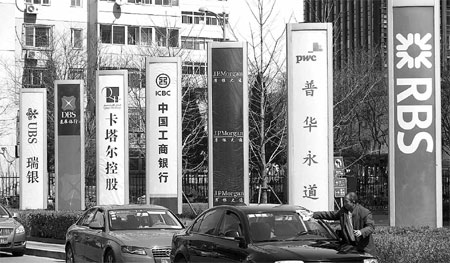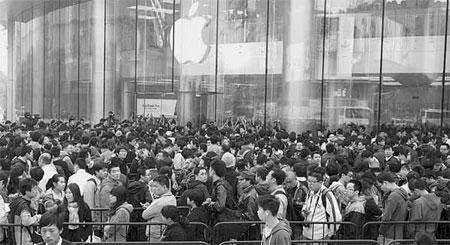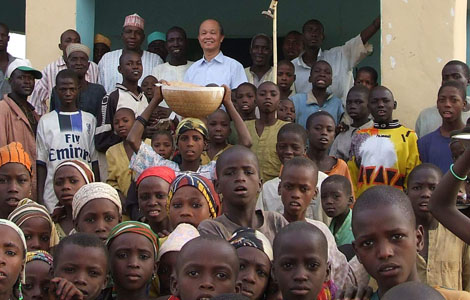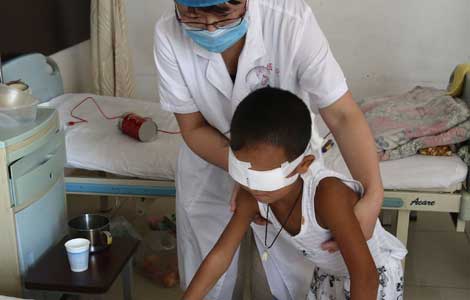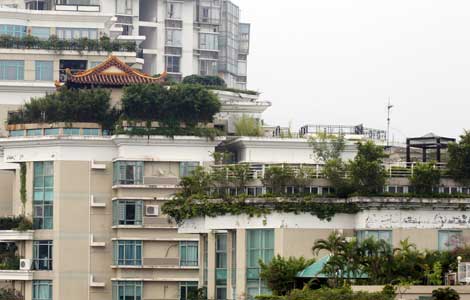Beijing prioritizes restructuring push
Updated: 2013-09-03 07:16
By Li Jiabao (China Daily)
|
||||||||

|
About 400,000 jobs were created in the capital in the first half, with the most positions in finance, tenancy and business services, scientific research and technical services. The per capita disposable income of urban residents rose 9.4 percent year-on-year in the same period. Provided to China Daily |
|
From 2006 to 2010, retail sales in Beijing rose 16.4 percent annually. However, retail sales only rose 8.8 percent year-on-year in the first half, the slowest growth pace in 11 years. Provided to China Daily |
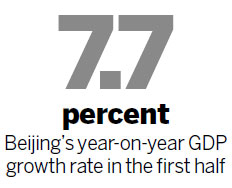
City government officials willing to tolerate slower growth 'within reasonable scope'
Faced with the economic slowdown in Beijing, the capital's municipal government is showing greater tolerance toward slower growth, while highlighting the need to restructure the growth model.
"Economic growth in the first half of the year stayed within the reasonable scope and the restructuring process of economic growth made progress," Wang Anshun, Beijing's mayor, told a recent conference. "The key point of our work is to improve the economic structure and change the growth model."
Beijing's GDP expanded 7.7 percent year-on-year in the first half. It was 7.9 percent in the January-to-March period, according to data from the municipal government. The country's GDP increased 7.6 percent year-on-year in the first half.
"The city's economy generally developed well in the first half. Although some sectors experienced a slower growth pace in the second quarter, the employment market remained stable and the performance of companies improved. Residents' incomes also saw faster growth. The quality of the city's economy was enhanced," said Yu Xiuqin, spokeswoman for the Beijing Municipal Bureau of Statistics.
About 400,000 jobs were created in the capital in the first half, with the most positions in finance, tenancy and business services, scientific research and technical services. Meanwhile, the per capita disposable income of urban residents rose 9.4 percent year-on-year in the same period, compared with the 9.1 percent growth seen across the country.
"The potential economic growth of Beijing is now between 7 and 8 percent, compared with 10 percent in past years. A growth pace faster than that will lead to shortages of resources and inflation, and would not be sustainable. A growth pace slower than that will cause unemployment," said Zhao Lei, deputy director of the Beijing Municipal Commission of Development and Reform.
"The municipality's economic growth in the first half was adequate. It's in line with the city's potential, supply of resources and the restructuring drive, and thus is moderate and sustainable," Zhao said.
He added that the restructuring process of the city's economic growth will lead to a growth path driven by high-end industries and innovation, which is also "green" growth.
"We need to keep economic growth at a moderate pace. Otherwise, employment and residents' incomes will be jeopardized," Wang said.
The municipal government outlined an 8 percent full-year GDP growth target and a 7.5 percent real growth target for the income of urban and rural residents, Wang added.
"Judging from the economic development in the first half, the full-year targets are achievable if we keep working hard," Wang said.
He added that the global economy is going through a deep restructuring process with the United States and the European Union seeing a weak recovery and emerging economies facing risks of an economic slowdown.
Meanwhile, economic growth in Beijing, as in the country, is being confronted with great pressure due to unsteady growth, and 11 out of the 20 economic indicators in the city missed the annual targets in the first half, according to Wang.
"Domestic demand lacks a strong driving force while growth slowed in key industries such as manufacturing, financial services and technological services," Wang said.
Guo Jinlong, Party secretary of Beijing, said that despite achievements in the first half, "we have to be aware of the challenges, which mainly come from the eased growth in investment and consumption. In the second half, downturn pressure for economic growth will be greater than in the first half in view of the city's service-driven economic structure".
Driven by consumption
Beijing has developed into a consumption-driven economy with consumption contributing more than 70 percent of its GDP growth. From 2006 to 2010, retail sales rose 16.4 percent annually. In 2008, the capital became the country's largest city in terms of retail sales.
However, retail sales only rose 8.8 percent year-on-year in the first half, the slowest growth pace in 11 years.
"There are deep reasons for the slowdown. The growth of urban household incomes fell, which dented the willingness of people to consume. In addition, restrictions on the purchase of houses and cars keep weakening the growth momentum, while the consumption potential in emerging sectors, such as education, culture and recreation, has yet to be unleashed," Wang said.
Chen Ji, head of the industrial research institute at the Capital University of Business and Economics in Beijing, said that the city's consumption growth in the first half is very important against the overall economic growth slowdown, and the government should further steer the economy toward a path driven by domestic demand.
Wang added that the key to expand domestic demand lies in consumption and that "we need to further improve policies to increase the incomes of urban and rural residents and boost their willingness to spend. In addition, we must attach great importance to the emerging frontier of consumption and strengthen the contribution of consumption to economic growth".
In the second half, Beijing will introduce policies related to credit and furniture trade-in, while boosting the development of cross-border e-commerce and consumption for services in healthcare, education, culture and recreation, according to Wang.
"In addition, we will also make full use of investment as the central government simplifies investment approvals. Investment is the most direct and effective driver for economic growth," Wang said.
The city's fixed-asset investment started to ease in April and only 32 out of 68 planned key projects were started in the first half because of approval procedures, compensation disputes for land use and slowed funding, Wang added.
"We don't lack projects because private capital is abundant and projects for infrastructure, environment and social development won't lead to redundant building," Wang said. "The key move is to deepen reforms and make full use of market mechanisms to encourage all kinds of investment. We'll introduce specific measures to solve the challenges of slow approval processes and high costs in land use to keep a steady and optimized investment growth."
In the second half, the municipal government will boost consumption and investment to stabilize economic growth and fulfill the full-year targets, said Zhao at the Beijing Municipal Commission of Development and Reform.
In the January-to-June period, foreign direct investment in Beijing rose 10.4 percent year-on-year to $4.91 billion, with the service sector accounting for 83.8 percent of the total inflow, according to the Beijing Municipal Commission of Commerce.
lijiabao@chinadaily.com.cn
(China Daily 09/03/2013 page17)
Most Viewed
Editor's Picks
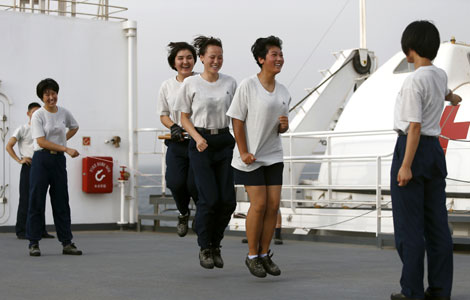
|

|

|

|

|

|
Today's Top News
Chinese applicants to US down
Jiang Jiemin removed from office: authority
Police reveals more about GSK China's violations
'Jurassic Park 3D' atop Chinese box office
US Marines website hacked by pro-Syria hackers
Rousseff consults cabinet on US spy claims
President Xi leaves for Central Asia visit
Banks rake in profits
US Weekly

|

|
